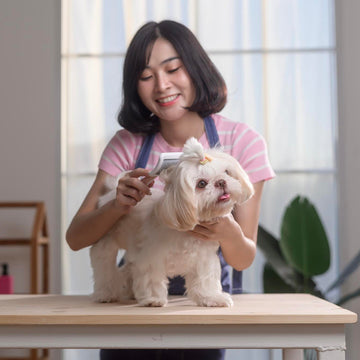As pet owners, one of the most important responsibilities we have is ensuring the health and well-being of our furry companions. While feeding, exercising, and providing medical care are all essential, grooming is often overlooked. However, regular grooming is just as important for your pet’s health as their diet or daily walks.
In this blog post, we’ll explore the importance of grooming, the benefits it provides, and essential tips for maintaining your pet’s coat, skin, and overall hygiene.
Why Is Pet Grooming Important?
Grooming is more than just about keeping your pet looking good. It's an integral part of their overall health and well-being. Here's why grooming matters:
-
Maintaining a Healthy Coat: Regular grooming helps to remove dirt, debris, and loose fur, preventing matting and tangles that can cause discomfort. It also stimulates the skin and distributes natural oils that keep the coat shiny and healthy.
-
Preventing Skin Problems: Pet grooming helps identify early signs of skin infections, rashes, or parasites like fleas and ticks. By inspecting their coat regularly, you can catch potential issues before they become serious.
-
Promoting Good Hygiene: Grooming helps maintain proper hygiene by cleaning areas that are often neglected, such as paws, ears, and teeth. A clean pet is a healthy pet!
-
Reducing Shedding: Regular grooming reduces the amount of hair your pet sheds around the house. By removing dead hair before it falls out, you can keep your home cleaner.
-
Bonding Time: Grooming can also be a bonding experience for you and your pet. Whether it’s brushing their fur or giving them a bath, these moments strengthen your connection and help your pet feel more secure in your care.
Essential Grooming Tools for Pet Owners
Having the right grooming tools can make the process easier and more effective. Here are some of the most important tools every pet owner should have:
-
Brushes: Depending on the type of fur your pet has, different brushes are needed. For example, a slicker brush is great for long-haired dogs, while a bristle brush is ideal for short-haired pets. Regular brushing will help prevent tangles and mats while keeping their coat shiny.
-
Nail Clippers: Keeping your pet’s nails trimmed is crucial for their comfort and health. Overgrown nails can cause pain, mobility issues, and even lead to infections. A regular trim ensures your pet can move freely and comfortably.
-
Ear Cleaner: Pet ears can accumulate wax, dirt, and moisture, leading to infections. Using an ear cleaner designed for pets can help maintain ear health.
-
Shampoo and Conditioner: When bathing your pet, always use products that are formulated for animals. Human shampoos can be too harsh for their sensitive skin. Pet-friendly shampoos are available in different formulas for specific skin types (e.g., dry, itchy, sensitive).
-
Toothbrush and Toothpaste: Just like humans, pets need their teeth brushed regularly to prevent plaque buildup and dental diseases. Use a pet-specific toothbrush and toothpaste to make this task easier.
Grooming for Different Pets
Grooming needs vary depending on the species, breed, and even the individual pet. Here's a breakdown for different pets:
Dogs
-
Coat Care: Depending on the breed, some dogs require frequent grooming while others only need it occasionally. Long-haired breeds like Shih Tzus and Collies require regular brushing and occasional haircuts, while short-haired breeds like Beagles or Boxers may need less attention.
-
Nail Care: Dogs that walk on hard surfaces naturally wear down their nails, but if your dog’s nails aren’t getting worn down, you’ll need to trim them every 3-4 weeks.
-
Bathing: Dogs generally only need to be bathed every 4-6 weeks, but it depends on the breed, coat type, and whether they get into messy situations.
Cats
-
Coat Care: Cats, especially long-haired breeds like Persians or Maine Coons, require regular brushing to prevent mats and tangles. Short-haired cats need less frequent brushing, but they still benefit from regular maintenance.
-
Nail Care: Cats usually do a good job of keeping their claws trimmed by scratching, but if you notice they’re becoming overgrown, it’s a good idea to trim them.
-
Bathing: Cats are typically great self-groomers and rarely need baths unless they get into something messy or have a medical condition. Over-bathing can strip their coat of natural oils.
Small Animals (Rabbits, Guinea Pigs, Hamsters)
-
Coat Care: Small animals like rabbits and guinea pigs require occasional brushing to remove loose fur and prevent hairballs. Long-haired breeds require more frequent grooming.
-
Nail Care: Like cats and dogs, small animals also need their nails trimmed regularly to prevent them from growing too long and causing injury.
-
Bathing: Most small animals don't need regular baths, but some may benefit from occasional gentle cleaning if they become dirty.
Tips for Grooming Success
-
Start Early: If you have a young pet, start grooming them early to get them used to the process. This will make grooming much easier as they grow older.
-
Use Positive Reinforcement: Grooming can be a bonding experience for both of you, so reward your pet with treats, praise, and affection. This will help them associate grooming with positive experiences.
-
Go Slow and Be Gentle: Some pets may not be fond of grooming, especially if it’s their first time. Be patient, gentle, and take your time. Never force your pet into a grooming session, as this could create a negative association.
-
Keep Their Environment Calm: Make sure the grooming area is quiet and free from distractions. This will help your pet stay relaxed during the process.
-
Visit a Professional Groomer: If you're unsure about how to groom your pet, or if your pet requires special grooming needs, consider visiting a professional groomer. They have the expertise and tools to handle your pet with care.
Conclusion
Regular grooming is an essential part of your pet's health and happiness. It keeps them clean, comfortable, and helps prevent health issues such as skin infections, matting, and dental diseases. With the right tools and techniques, grooming can also be a rewarding bonding experience between you and your furry friend.
Remember, each pet has unique grooming needs, so adjust your routine accordingly. Whether you do it yourself or enlist the help of a professional, make sure grooming is a regular part of your pet’s care to keep them happy, healthy, and looking their best!




